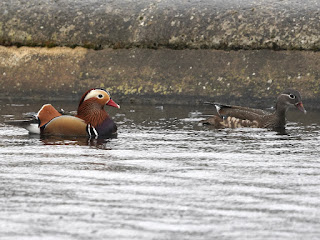It was a cold dark wet day. Mandarins are indifferent to these things ...
... but the young Grey Herons, huddled together in their nest, were looking soggy and miserable.
The heron with the red bill is still occupying the other nest.
Another heron was fishing from a fallen tree in the Long Water.
A Mute Swan ate the leaves of an overhanging willow tree.
A pair of Egyptian Geese were making a fuss on an oak in the leaf yard. They often nest some way from water, and then have to take their goslings on a long and dangerous hike to the nearest lake.
The Great Crested Grebes east of the Lido have, as expected, made a nest on the outside of the netting. They just don't realise that the other side is safer. They could even nest in the reeds here, but the habit of nesting in reeds hasn't penetrated to their culture. The grebes in the Norfolk Broads make nests in and from reeds all the time. Here the grebe has seen a Coot trying to steal a twig from the messy bundle and is coming over to deal with it. The Coot left in a hurry.
A young Cormorant on the Diana fountain landing stage looked like a disreputable penguin.
A Green Woodpecker could be seen poking about in the wet grass between the Dell and the Rose Garden.
A few minutes later it appeared again searching for insects in the bark of a tree.
Starlings and a Carrion Crow enjoyed a splash in the Serpentine.
A Jay beside the Long Water had the colourful background of a fallen kite.
A squirrel was making a drey in the huge Caucasian elm in the Rose Garden, though the drey itself was invisible in the thick fan of branches.
Primroses are coming out near the bridge. Decades ago an old Australian gardener planted primroses and cowslips here, and they are still appearing reliably every year.
To cheer up today's grey pictures, here are two taken yesterday by Ahmet Amerikali in Southwark Park: a Blackcap in new leaves ...
... and a Dunnock in yellow forsythia blossom.












%202023%201a.jpg)
%202023%201a.jpg)
Pretty sure that's a Forsythia, not jasmine.
ReplyDeleteThanks. Changed.
DeleteDo you have special weather protection for the cameras Ralph??
ReplyDeleteSean
Just the ordinary things.
DeleteWasn't 'penguin' a Welsh name for the Razorbill, which mariners gave penguins because they looked like them?
ReplyDeleteI guess the poor young Herons aren't halfway as insulated as ducks. Poor things.
Tinúviel
'Penguin' originally referred to the now extinct Great Auk: pen gwyn is Welsh for 'white head'. which it had in winter plumage.
Delete